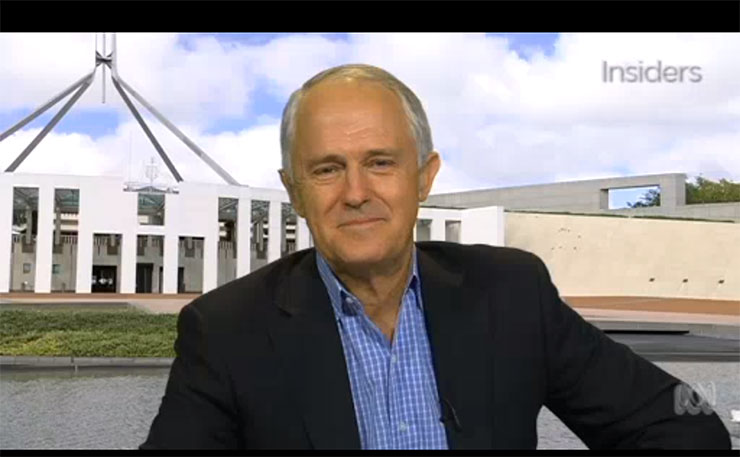History indicates the Coalition is unlikely to call a double dissolution, writes Ben Eltham. Common sense says the same.
At around about this point in electoral term, talk often turns to that rare beast, the double dissolution election.
Today the talk is that the government will rush to one shortly after tying up its Senate voting reform bill, introduced to parliament yesterday. This bill will introduce optional preferential voting in the upper house, presumably making it harder for micro-parties to get elected.
“The prospect of a double dissolution election looms over the return of Parliament today,” the ABC reported yesterday.
The double dissolution is really just a federal election at which the whole Senate is up for election (normally, only half the Senate is elected). Section 57 of the Australian Constitution provides for a mechanism by which the government of the day can call a double dissolution when there is serious disagreement between the upper and lower houses – for instance, if the Senate rejects the same bill twice.
There have only been six double dissolutions in Australian political history; the last was in 1987, when Bob Hawke called one over his government’s ill-fated proposal for a national identity card.
Of course, that election was not really fought on the issue of the Australia Card. It was a fairly normal campaign, in which the government campaigned on its record and sought to publicise disunity in the Coalition. The economy was booming and Hawke won a third term, though a dogged John Howard did better than expected to gain a small swing to the opposition.
Since 1987, we’ve seen plenty of talk about double dissolutions. Peter Costello threatened one in John Howard’s first term. Howard and Peter Reith put him back in his box. Howard then thought about calling one in late 1997 over native title legislation. He didn’t. Howard thought about it again in mid-2003, with Simon Crean languishing in the polls. In the end Howard won majorities in both houses of parliament at a conventional poll in 2004. Kevin Rudd also thought very seriously about calling one in early 2010, over the rejection of his carbon pricing legislation. Perhaps he should have. But he didn’t.
That’s the thing about double dissolutions. They are often talked about, but rarely called. There are some good reasons for this, and they almost certainly mean Malcolm Turnbull will not call a double dissolution election either.
For a start, there are a bunch of constitutional complexities. Calling a double dissolution too late in a term is actually prohibited: they can’t be called within six months of the end of a parliamentary term. Tthe House of Representatives term expires on 11 November 2016. This means a DD election must be called by 11 May.
The second week of May is budget week. You can imagine the mayhem that would be involved. Malcolm Turnbull and the government would have to pass the budget in a matter of hours, then rush to Yarralumla to ask Peter Cosgrove for an election.
This seems unlikely, for the simple reason that if the Senate didn’t pass the budget before the election, the government would start to run out of money.
And yet, so feverish has speculation become, there has even been talk about moving the budget forward, perhaps to April. Given the shambles the government has made of tax reform, this seems a long bow to draw. Scott Morrison is already struggling with his spreadsheets. Giving him an early deadline invites disaster.
Even were the government to win a double dissolution election, there would be trouble ahead. The Constitution sets a particular timetable for both houses of parliament; the Senate tends to be out of step with the House of Representatives. Calling a DD election creates all sorts of headaches for the future, including the possibility of a stand-alone half-Senate election sometime in 2018.
There are also some eminently political reasons for not calling a double dissolution. Voters tend to be displeased by early elections. Many citizens rightly believe that the cut and thrust of day-to-day politics is a poor reason to call an election early. Julia Gillard’s decision to call the 2010 election in August seemed like the right thing to do at the time, but as Labor’s campaign degenerated, it quickly became clear she had miscalculated. An early election from Campbell Newman in Queensland in 2015 also spectacularly backfired.
Furthermore, since the Howard years, we’ve come to expect our elections in September, October or November. The 2013 election was in September. A three-year term would place this year’s election at around the same time.
Given they are so rare, why do we keep talking double dissolutions, anyway?
One reason is that governments are always tempted by the idea. As bill after bill is voted down or amended beyond recognition, the government’s urge to get rid of a recalcitrant Senate grows and grows. A double dissolution promises a clean slate, in which the troublesome minor parties are swept away by the new broom of democracy.
The problem is, of course, that any double dissolution elects a new bunch of senators, many of whom may be just as disagreeable as the last lot. So governments tend simply to threaten double dissolutions, safe in the knowledge that they won’t actually follow through.
But the main reason we keep talking about double dissolutions is that the media loves it. As Annabel Crabb noted earlier this month, double dissolution speculation is a “favourite pundit sport” of the commentariat.
Crabb wisely advises us to ignore the frenzy. There is little chance of a double dissolution this year.
What the speculation really shows is that the Turnbull government is in a surprising amount of trouble.
Dithering over policy, struggling to get its talking points straight, with the cabinet constantly reshuffling and with a former prime minister plotting revenge on the backbench … the Coalition in 2016 is beginning to resemble Labor in 2013.
That must be worrying for Tony Nutt and the Liberal Party hardheads. 2016 looks like being a competitive year after all.
Donate To New Matilda
New Matilda is a small, independent media outlet. We survive through reader contributions, and never losing a lawsuit. If you got something from this article, giving something back helps us to continue speaking truth to power. Every little bit counts.





